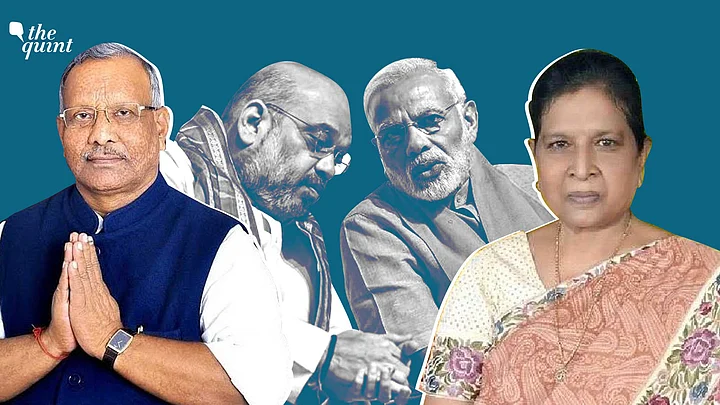The Bharatiya Janata Party (BJP) has made its priorities clear by nominating two deputy chief ministers in Bihar – Renu Devi and Tarkishore Prasad – instead of Sushil Kumar Modi, who had held the position from 2005 to 2013 and then again from 2017 to 2020.
The most obvious signal is that the BJP wants to make it clear to Chief Minister Nitish Kumar who the big brother in the alliance is. This is for the first time that the BJP has won more seats than its alliance partner.
Tarkishore Prasad has retained most of Sushil Modi’s erstwhile portfolios like finance, commercial taxes and, information technology and forest and environment, in addition to urban development.
Renu Devi has got panchayati raj, welfare of backward classes and industry
However, there's more to the choices of Renu Devi and Tarkishore Prasad which reveal a great deal about the BJP's plans for Bihar.
Yet Again, Modi-Shah Chose Leaders Who Keep Low Profiles
Both Renu Devi and Tarkishore Prasad aren't quite political lightweights. Both are four-term MLAs. Devi was even a minister.
But, they are both leaders who have consistently maintained low profiles and have a strong organisational background. While Tarkishore Prasad has come up through the Rashtriya Swayamsevak Sangh’s (RSS) students' wing, the Akhil Bharatiya Vidyarthi Parishad (ABVP), Renu Devi has been associated with the BJP's Mahila Morcha since the late 1980s and has risen up the ranks.
This is consistent with many of the chief ministerial and deputy chief ministerial choices the BJP has made under the leadership of Prime Minister Narendra Modi and Home Minister Amit Shah.
For instance, Haryana CM Manohar Lal Khattar, former Jharkhand CM Raghubar Das, Uttarakhand CM Trivendra Singh Rawat, Himachal Pradesh CM Jai Ram Thakur, etc., are all low-profile, organisationally-rooted leaders.
In fact, except for the appointment of Yogi Adityanath as the chief minister of Uttar Pradesh and the continuation with BS Yediyurappa in Karnataka and Shivraj Singh Chouhan in Madhya Pradesh, it is low-profile leaders who have been preferred for the CM’s post.
Clearly, the Modi-Shah duo prefer leaders who remain loyal and do the work quietly.
Balancing Caste and Region
In appointing Renu Devi and Tarkishore Prasad, the BJP is also trying to balance caste and regional factors. Renu Devi belongs to the Noniya caste that falls under the Extremely Backward Caste (EBC) category.
By appointing an EBC woman as Deputy CM, the BJP is staking claim to two of Nitish Kumar's vote banks – EBCs and women.
Tarkishore Prasad, on the other hand, is from the Karwal Vaishya community that fall in the Other Backward Class (OBC) category. Vaishyas have been among the strongest votebanks for the BJP.
It is significant that the party chose not to appoint an upper-caste leader as a deputy CM, despite receiving massive support from them.
The idea could be to avoid projecting the BJP as a party of dominant castes, that may scare away EBCs and Mahadalits, whose votes the BJP is keen to cultivate.
An EBC woman and an OBC deputy CM would also restrict Nitish Kumar's ability to project himself as the saviour of non-dominant castes from both upper castes and Yadavs.
The third crucial appointment is senior leader Nand Kishore Yadav as the Assembly Speaker, a position that has come to the BJP after being with the JD(U) under previous NDA governments.
The inclusion of Mukesh Sahani of the Vikassheel Insaan Party (VIP) as a minister also indicates the BJP's plan to cultivate the Kewat/Mallah community to which Sahani belongs.
In terms of region, too, a balance has been struck. While Tarkishore Prasad comes from Katihar in the Seemanchal region in the northeastern end of Bihar, Renu Devi is from Bettiah in the north-western end and Nand Kishore Yadav is from Patna.
A Party in Transition
What the appointments also indicate is that the BJP in Bihar needs to be seen as a party in transition, which is at two levels.
At one level, it is moving away from a leadership whose formative years were during the Emergency to one whose formative years were during the Ram Janmabhoomi movement.
In the long run, this would mean a much more ideologically strident approach and less cooperation with socialist parties that was the legacy of the anti-Emergency protests.
Another level of transition is that the BJP seems to be already preparing for a post-Nitish Kumar reality in which the party's aim would be to form a government on its own.
Its priority during this period would be to cannibalise as much of Nitish Kumar's base among EBCs and Mahadalits as possible.
The Karnataka Model
While the BJP has three deputy CMs in Uttar Pradesh, the Bihar arrangement is slightly more similar to the BJP government in Karnataka under BS Yediyurappa. It has three deputy chief ministers belonging to different castes. All three have been low-profile leaders and have been completely loyal to the BJP's central leadership.
Although, unlike Nitish Kumar, BS Yediyurappa is from within the BJP, he has maintained a great deal of independence vis-a-vis both the BJP's national leadership as well as the Sangh.
It is clear that in Karnataka, too, the BJP is preparing for a post-Yediyurappa era and in the meantime, trying to keep important caste groups happy and retain control through loyal, low-profile leaders.
This is now being replicated in Bihar as well.
(With inputs by Arun Dev)
(At The Quint, we question everything. Play an active role in shaping our journalism by becoming a member today.)
